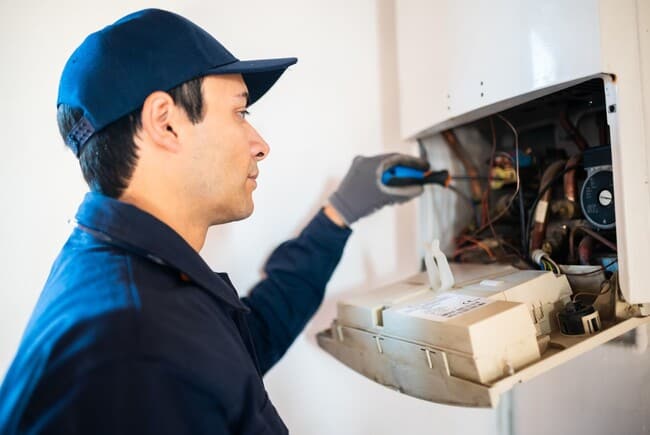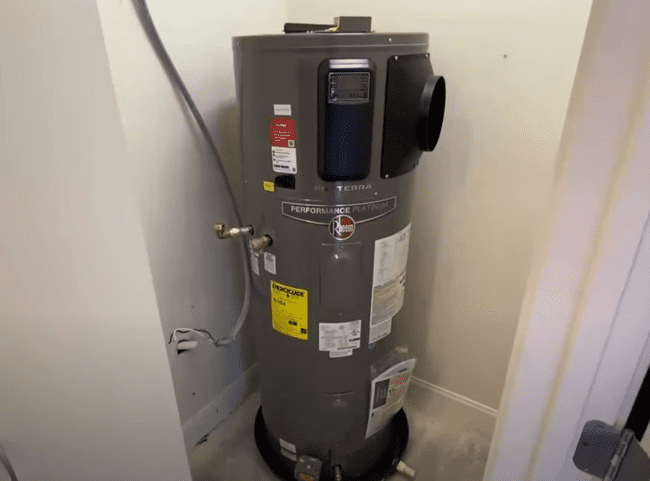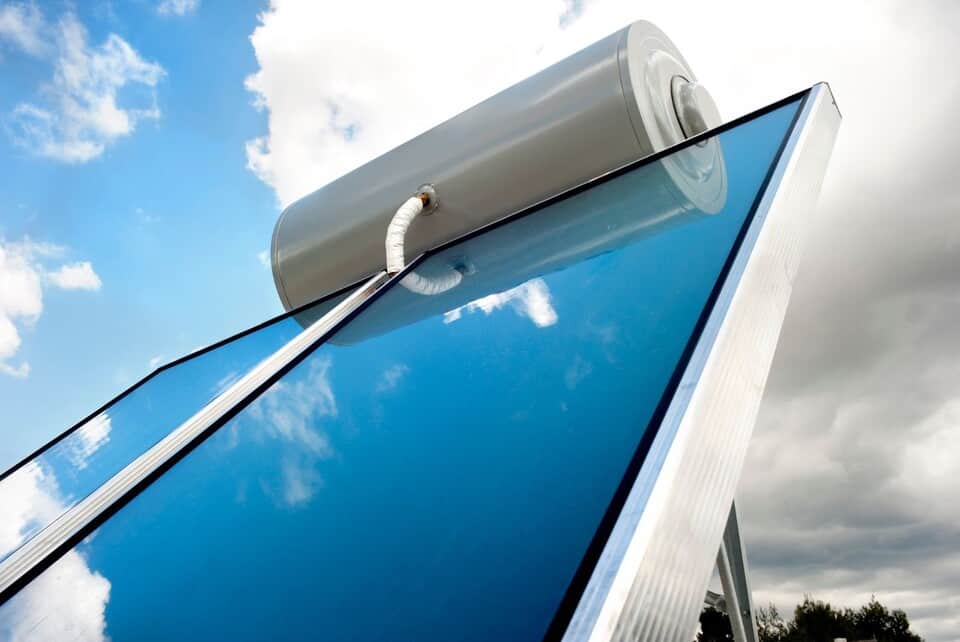If you’re looking to reduce your energy bills and carbon footprint, one of the best places to start is with your hot water heating system. Traditional hot water heaters can be incredibly inefficient, wasting energy and driving up your utility bills. Fortunately, there are a number of energy-efficient options available that can help you save money and reduce your impact on the environment.
Solar hot water heating is most efficient because it harnesses the sun’s abundant energy to heat water, reducing fossil fuel or electricity use. This leads to lower utility bills, and reduced greenhouse emissions. Installation cost are greater though.
One of the most popular energy-efficient options for hot water heating is a tankless water heater. Unlike traditional water heaters, which constantly heat and store water in a large tank, tankless heaters only heat water as it’s needed. This means they use less energy overall and can help you save money on your utility bills. Plus, they’re typically smaller and more compact than traditional heaters, making them a great option for homes with limited space.
Another option to consider is a heat pump water heater. These systems use electricity to move heat from the air or ground to heat your water, making them much more efficient than traditional electric heaters. While they can be more expensive to install upfront, they can provide significant savings over time and may even qualify for rebates or tax incentives in some areas.
Comparing Water Heater Technologies
When it comes to energy-efficient hot water heating, there are several technologies to choose from. Here, we’ll compare three popular options: solar water heaters, heat pump water heaters, and tankless water heaters.
Solar Water Heaters
Solar water heaters use energy from the sun to heat water. They are an excellent option for those who live in sunny areas and want to reduce their carbon footprint. Solar water heaters have a higher upfront cost than traditional water heaters, but they can save you money in the long run.
One downside of solar water heaters is that they may not work as efficiently on cloudy days or during the winter months. Additionally, installation can be more complicated, as it requires a solar collector and storage tank.
Heat Pump Water Heaters
Heat pump water heaters use electricity to move heat from the air or ground to heat water. They are more energy-efficient than traditional water heaters, but they also have a higher upfront cost.
One benefit of heat pump water heaters is that they can work in any climate, as long as the surrounding air or ground is warm enough. However, they may not work as efficiently in very cold temperatures.
Tankless Water Heaters
Tankless water heaters heat water on demand, rather than storing hot water in a tank. They are more energy-efficient than traditional water heaters, as they don’t waste energy keeping a large tank of water hot.
One downside of tankless water heaters is that they may not be able to keep up with high hot water demand, such as when multiple people are showering at the same time. Additionally, they have a higher upfront cost than traditional water heaters.
Overall, each technology has its own benefits and drawbacks. Consider your climate, hot water demand, and budget when choosing the best option for your home. Check out this article on tankless heaters.

Evaluating Energy Efficiency Metrics
When evaluating energy efficient hot water heating systems, it’s important to understand the different metrics used to measure their efficiency. This section will cover two common metrics, Energy Factor (EF) and Uniform Energy Factor (UEF), as well as Estimated Annual Operating Costs.
Energy Factor (EF)
The Energy Factor (EF) is a measure of the overall efficiency of a hot water heater. It takes into account the amount of hot water produced per unit of fuel consumed, as well as the amount of standby heat loss. The higher the EF, the more efficient the hot water heater.
Energy Factor (EF) = Energy Output (Btu) / Energy Input (Btu)
EF is calculated by dividing the usable energy output of the hot water heater by the energy input. Usable energy output is the amount of hot water produced per unit of fuel consumed, while energy input is the amount of fuel consumed, including both the fuel used to heat the water and the fuel used to keep the water hot when it’s not being used.
Uniform Energy Factor (UEF)
The Uniform Energy Factor (UEF) is a newer metric that was introduced in 2015. It is similar to EF, but it also takes into account the energy used by the hot water heater’s other components, such as the pumps and fans. This makes it a more accurate measure of a hot water heater’s overall efficiency.
Like EF, UEF is calculated by dividing the usable energy output of the hot water heater by the total energy input. However, the total energy input used for UEF includes the energy used by the hot water heater’s other components.
Estimated Annual Operating Costs
When evaluating the energy efficiency of a hot water heater, it’s also important to consider the estimated annual operating costs. This includes not only the cost of the fuel used to heat the water, but also the cost of maintaining and operating the hot water heater.
Many hot water heaters come with an EnergyGuide label that provides an estimate of the annual operating costs based on the national average cost of fuel and average usage patterns. This can be a useful tool for comparing the energy efficiency of different hot water heaters.
In addition, many utility companies offer rebates or incentives for upgrading to a more energy efficient hot water heater. Be sure to check with your utility company to see if you qualify for any programs.
Climate and Location Considerations
When it comes to energy-efficient hot water heating, climate and location are important factors to consider. Here are two sub-sections that will help you determine the best options for your area:
Solar Suitability and Insolation
If you live in a sunny area, solar hot water heating may be a great option for you. Solar water heaters use energy from the sun to heat water, which can significantly reduce your energy bills. To determine if your location is suitable for solar hot water heating, you need to consider the amount of sunlight your area receives.
Insolation is a measure of the amount of solar radiation that reaches a particular area. The higher the insolation, the more energy a solar water heater can generate. You can check the insolation levels for your area using online tools or by consulting with a professional.
Ambient Temperature and Heat Pump Efficiency
In colder areas, a heat pump water heater may be a better option. Heat pumps work by extracting heat from the air and using it to heat water. However, they are less efficient in colder temperatures, so it’s important to consider the ambient temperature of your area when choosing a heat pump water heater.
Heat pump water heaters have a coefficient of performance (COP) rating that indicates their efficiency. The higher the COP, the more efficient the water heater. In colder areas, you’ll want to choose a heat pump with a high COP rating to ensure maximum efficiency.
Assessing Your Household’s Hot Water Needs
Before choosing an energy-efficient hot water heater, you need to assess your household’s hot water needs. This will help you determine the appropriate size and capacity of your hot water heater. Here are some steps to help you assess your household’s hot water needs:

Estimating Daily Hot Water Demand
The first step in assessing your household’s hot water needs is to estimate your daily hot water demand. This will help you determine the appropriate size and capacity of your hot water heater. Here are some factors to consider when estimating your daily hot water demand:
- The number of people in your household
- Their ages and habits (e.g. shower length, frequency of baths, etc.)
- The number and type of hot water appliances in your home (e.g. dishwasher, washing machine, etc.)
Once you have considered these factors, you can use a hot water calculator to estimate your daily hot water demand. This will give you an idea of the appropriate size and capacity of your hot water heater.
Choosing the Appropriate Size and Capacity
After estimating your daily hot water demand, you can choose the appropriate size and capacity of your hot water heater. Here are some factors to consider when choosing the appropriate size and capacity:
- Your estimated daily hot water demand
- The type of hot water heater (e.g. tank vs. tankless)
- The energy efficiency of the hot water heater
- Your budget
It is important to choose a hot water heater that is appropriately sized and has the right capacity for your household’s needs. An undersized hot water heater will not be able to meet your hot water demands, while an oversized hot water heater will waste energy and money.
Long-term Costs and Savings
Initial Investment and Installation Costs
When considering an energy-efficient hot water heating system, it’s important to think about the initial investment and installation costs. While these systems may cost more upfront than traditional systems, they can save you money in the long run.
The cost of installing an energy-efficient hot water heating system varies depending on the type of system you choose and your location. On average, a system can cost between $2,500 and $6,000 to install. However, this investment can pay off over time with lower energy bills.
Ongoing Maintenance Expenses
Energy-efficient hot water heating systems typically require less maintenance than traditional systems. However, it’s important to keep up with regular maintenance to ensure the system continues to operate efficiently.
Regular maintenance may include flushing the system to remove sediment buildup, checking for leaks, and inspecting the system’s components. The cost of maintenance varies depending on the type of system you have and your location. On average, you can expect to pay between $100 and $300 per year for maintenance.
Potential Rebates and Tax Incentives
Many energy-efficient hot water heating systems qualify for rebates and tax incentives. These incentives can help offset the initial investment and installation costs, making the system more affordable.
Rebates and tax incentives vary depending on your location and the type of system you choose. Some incentives may be offered by your local utility company, while others may be offered by state or federal programs. Be sure to research available incentives before making your purchase.

Conclusion
By implementing energy efficient hot water heating systems, you can significantly reduce your energy bills while also helping the environment. Throughout this article, we have discussed various methods and technologies that can help you achieve this goal.
Firstly, we talked about the importance of proper insulation and how it can prevent heat loss from your hot water tank. We also explored the benefits of using a tankless water heater, which can save energy by only heating water when it is needed.
We then discussed the advantages of using a solar water heating system, which can provide hot water without relying on fossil fuels. Additionally, we touched on the benefits of using a heat pump water heater, which can extract heat from the surrounding air or ground to heat your water.
Finally, we talked about the importance of regular maintenance and proper usage of your hot water system. By following these tips and implementing energy-efficient technologies, you can save money and reduce your carbon footprint.
Remember, every small step counts when it comes to energy conservation. By making these changes, you can contribute to a more sustainable future for yourself and the planet.


